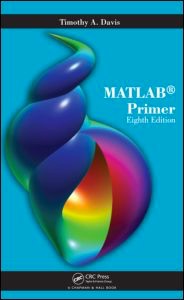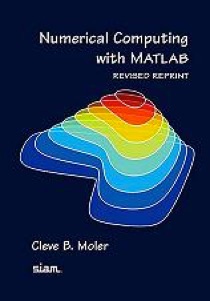Fall 2012

COT 4501 -- Numerical analysis, a computational approach
Catalog description and prerequisites
COT 4501 Numerical Analysis-A Computational Approach. Credits: 3; Prereq: COP 3504 or COP 3503 and MAS 3114. Numerical integration, nonlinear equations, linear and nonlinear systems of equations, differential equations and interpolation.
Course Objectives
You rely on computational numerical methods every day, sometimes without even knowing it. Did you use Google to find this web page? If so, you were selecting among the largest entries of the eigenvector corresponding to the second largest eigenvalue in a rather large matrix (about 20 billion by 20 billion, I would guess, with one row or column for each web page on the planet), considering only entries for pages containing terms in your search string. Don't worry if you don't understand that last sentence. At the end of this class, you will.
Computational Science has become the third branch of science, along with theory and experimentation. You can't do an experiment on, say, the sun, and building a nuclear fusion experiment is rather costly and hard to do. Theory can only take you so far. Computational Science bridges the gap: it can simulate complex scenarios that rely on theory and can be validated by experiments, but are beyond the reach of both.
Your cellphone (nonlinear systems, differential algebraic equations), your iPod (FFT), your car or plane used to get to campus (ordinary differential equations and partial differential equations), the roads and bridges you drove on (ditto), the weather prediction for your flight, all rely on computational numerical methods. Movies, video games, and other media also rely on them (The Cave Troll, for example). Without computational numerical methods, few of these would exist. OK, we might still have roads and bridges, but the Tacoma Bridge could have used some eigenvalue analysis and computational fluid dynamics; see also a video describing the collapse.
If you're in Computer Engineering / Computer Science, you need to know how computational numerical techniques work, because they are a fundamental part of the field.
The objectives of this course is to master the theory and practice of numerical integration, nonlinear equations, linear and nonlinear systems of equations, differential equations, and interpolation, so that they can be used to solve real-world problems.
Contribution to ABET-related outcomes:
(a) an ability to apply knowledge of mathematics, statistics, computer science, and electrical engineering as it applies to computer hardware and software.
(b) an ability to design and conduct experiments, as well as to analyze and interpret data.
-
(e)an ability to identify, formulate, and solve hardware and software computer engineering problems, accounting for the interaction between hardware and software.
Instructor:
Timothy A. Davis CSE E338. office phone: 352-505-1546. cell 352-359-2812
email: davis@cise.ufl.edu or DrTimothyAldenDavis@gmail.com
class web site: http://www.cise.ufl.edu/class/cot4501fa12/
Office hours: just after class, until at least 5pm (or later if there's still a line out my door), in CSE E338.
Teaching Assistants:
Qi Deng
Class meeting times:
Tuesdays 7th period (1:55pm-2:45pm) and Thursdays 7th-8th periods (1:55pm-3:50pm) in CSE E222.
Final exam: December 13, 10am to noon.
There is no lab or discussion section.
Material and Supply Fees:
None.
Textbooks:
Scientific Computing: An Introductory Survey, by Michael Heath (required). The book is on reserve in the Marston Science Library.
MATLAB Primer, 8th edition, by Tim Davis (optional). The book is on reserve in the Marston Science Library.
Numerical Computing with MATLAB, by Cleve Moler (a useful and free on-line reference, not required - just suggested if you want to read more about MATLAB for numerical methods).
You will require access to MATLAB. It is available on the CISE systems, and most UF computers. You can use MATLAB remotely from your own computer, by logging into CISE systems. You can also purchase the Student Edition of MATLAB if you want to run MATLAB on your computer directly. The cost is $99 (you don't need any toolboxes beyond the default ones provided).

Other Resource Links:
McGraw-Hill website for the textbook (Heath)
Heath's website for the textbook
Course outline:
Chapter 1: Scientific Computing (skip 1.5)
1.1 Introduction
1.2 Approximations in Scientific Computation
1.3 Computer Arithmetic
1.4 Mathematical Software
Chapter 2: Systems of Linear Equations (skip 1.8)
2.1 Linear Systems
2.2 Existence and Uniqueness
2.3 Sensitivity and Conditioning
2.4 Solving Linear Systems
2.5 Special Types of Linear Systems
2.6 Iterative Methods for Linear Systems
2.7 Software for Linear Systems
Chapter 3: Linear Least Squares (skip 3.9)
3.1 Linear Least Squares Problems
3.2 Existence and Uniqueness
3.3 Sensitivity and Conditioning
3.4 Problem Transformations
3.5 Orthogonalization Methods
3.6 Singular Value Decomposition
3.7 Comparison of Methods
3.8 Software for Linear Least Squares
Chapter 4: Eigenvalue Problems (skip 4.6 through 4.9)
4.1 Eigenvalues and Eigenvectors
4.2 Existence and Uniqueness (covered lightly)
4.3 Sensitivity and Conditioning
4.5 Computing Eigenvalues and Eigenvectors (covered lightly)
Chapter 5: Nonlinear Equations (skip 5.7 and 5.8)
5.1 Nonlinear Equations
5.2 Existence and Uniqueness
5.3 Sensitivity and Conditioning
5.4 Convergence Rates and Stopping Criteria
5.5 Nonlinear Equations in One Dimension
5.6 Systems of Nonlinear Equations
Chapter 6: Optimization (skip 6.5 through 6.9)
6.1 Optimization Problems
6.2 Existence and Uniqueness
6.3 Sensitivity and Conditioning
6.4 Optimization in One Dimension
Chapter 7: Interpolation (skip 7.5 and 7.6)
7.1 Interpolation
7.2 Existence, Uniqueness, and Conditioning
7.3 Polynomial Interpolation
7.4 Piecewise Polynomial Interpolation
Chapter 8: Numerical Integration and Differentiation (skip 8.4, and 8.7 through 8.9)
8.1 Integration
8.2 Existence, Uniqueness, and Conditioning
8.3 Numerical Quadrature (partial coverage)
8.5 Integral Equations
8.6 Numerical Differentiation
Chapter 9: Initial Value Problems for Ordinary Differential Equations (skip 9.4 and 9.5)
9.1 Ordinary Differential Equations
9.2 Existence, Uniqueness, and Conditioning
9.3 Numerical Solution of ODEs (lightly covered)
Chapters 10 to 13: skip
Attendance and expectations:
I expect you to attend class. I may take attendance on occasion. There are no penalties for absence, but you may miss any pop quizzes I may choose to have. When Tim Tebow was asked how he managed to obtain a 3.6 GPA while at the same time being heavily involved in UF football, his reply was “I went to class.” If Tim can do it, so can you. This Tim expects no less.
You may not use laptops in class without explicit permission. They are a distraction. I have sat in the back of another professor's class, and found that half of the students using laptops were not using them for class purposes. Likewise, you may not send/receive text messages, nor use your cell phone, nor fiddle with your iPod. Leave the devices at home; bring your brain instead. For more info, click here or here.
Grading:
Midterm: in class (2 hours), 30%. Date to be determined
Final: 30%
Quizzes: 10 "weekly" quizzes, about 10 minutes each, 1% each, on the date that HW's are due. Homeworks will typically be due on Thursdays, each week.
Homework: 10 homework assignments, 3% each.
Collaboration:
You may work together for all homeworks (unless I specifically state otherwise). No more than 3 people may work together on any one problem. If you work together, do not turn in multiple copies. Simply turn in one copy and state the names of those who worked on the homework. You may NOT simply add someone's name onto your homework if they did not actually work on it; to do otherwise is an Honesty Code Violation. If you work on just part of the homework together, then each person should turn in their homework. But don't turn in multiple copies of individual problems. Suppose students Alice, Bob, and Carol collaborate on problem 2 on a homework assignment of 4 problems. Then problem 2 need appear on just one student's homework, with a reference to the other two: “problem 2, collaboration between Alice, Bob, and Carol.” This statement should appear on all 3 student's assignments, and the full answer to problem 2 should appear just once. If students A, B, and C collaborate on all problems of a homework assignment, then only one student need turn in the homework, but that homework MUST state “Homework 3: collaboration between Alice, Bob, and Carol.” If it doesn't state this, then only one student will get credit for the homework.
Turning in homework:
Homework will be turned in on the UF e-Learning site at https://lss.at.ufl.edu/. You will not be submitting paper copies. Writing out the homework by hand is fine, but you will need to scan it in and submit the scanned version. Please use a resolution that is high enough to be legible by the TA, but not so high as to generate massive files.
Grading scale:
A: 90, B: 80, C: 70, etc. I will curve as needed. I also give plus and minus grades (87 is an A-, 84 a B+, 77 a B-, etc).
A C- will not be a qualifying grade for critical tracking courses. In order to graduate, students must have an overall GPA and an upper-division GPA of 2.0 or better (C or better). Note: a C- average is equivalent to a GPA of 1.67, and therefore, it does not satisfy this graduation requirement. For more information on grades and grading policies, please visit: https://catalog.ufl.edu/ugrad/current/regulations/info/grades.aspx
Makeup Exam/Quiz Policy:
Makeup exams are given if you are sick on the day of the exam, or if you have a pre-approved absence. For pre-approved absence, you must ask me before the exam.
Class pictures:
I will take pictures of each student in the class so that I and the TA can get to know you. Only the TA and myself will have access to the photos.
Other standard policy:
Honesty Policy: All students admitted to the University of Florida have signed a statement of academic honesty committing themselves to be honest in all academic work and understanding that failure to comply with this commitment will result in disciplinary action. This statement is a reminder to uphold your obligation as a UF student and to be honest in all work submitted and exams taken in this course and all others.
Accommodation for Students with Disabilities: Students Requesting classroom accommodation must first register with the Dean of Students Office. That office will provide the student with documentation that he/she must provide to the course instructor when requesting accommodation.
UF Counseling Services: Resources are available on-campus for students having personal problems or lacking clear career and academic goals. The resources include the UF Counseling and Wellness Center, 3190 Radio Rd, 392-1575, for psychological and psychiatric services; and the Career Resource Center, Reitz Union, 392-1601, career and job search services.
Software Use: All faculty, staff and student of the University are required and expected to obey the laws and legal agreements governing software use. Failure to do so can lead to monetary damages and/or criminal penalties for the individual violator. Because such violations are also against University policies and rules, disciplinary action will be taken as appropriate. We, the members of the University of Florida community, pledge to uphold ourselves and our peers to the highest standards of honesty and integrity.

